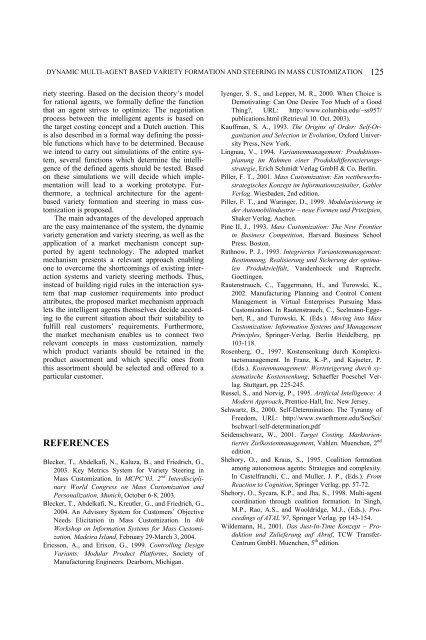Back Room Front Room 2
Back Room Front Room 2
Back Room Front Room 2
You also want an ePaper? Increase the reach of your titles
YUMPU automatically turns print PDFs into web optimized ePapers that Google loves.
DYNAMIC MULTI-AGENT BASED VARIETY FORMATION AND STEERING IN MASS CUSTOMIZATION<br />
riety steering. Based on the decision theory’s model<br />
for rational agents, we formally define the function<br />
that an agent strives to optimize. The negotiation<br />
process between the intelligent agents is based on<br />
the target costing concept and a Dutch auction. This<br />
is also described in a formal way defining the possible<br />
functions which have to be determined. Because<br />
we intend to carry out simulations of the entire system,<br />
several functions which determine the intelligence<br />
of the defined agents should be tested. Based<br />
on these simulations we will decide which implementation<br />
will lead to a working prototype. Furthermore,<br />
a technical architecture for the agentbased<br />
variety formation and steering in mass customization<br />
is proposed.<br />
The main advantages of the developed approach<br />
are the easy maintenance of the system, the dynamic<br />
variety generation and variety steering, as well as the<br />
application of a market mechanism concept supported<br />
by agent technology. The adopted market<br />
mechanism presents a relevant approach enabling<br />
one to overcome the shortcomings of existing interaction<br />
systems and variety steering methods. Thus,<br />
instead of building rigid rules in the interaction system<br />
that map customer requirements into product<br />
attributes, the proposed market mechanism approach<br />
lets the intelligent agents themselves decide according<br />
to the current situation about their suitability to<br />
fulfill real customers’ requirements. Furthermore,<br />
the market mechanism enables us to connect two<br />
relevant concepts in mass customization, namely<br />
which product variants should be retained in the<br />
product assortment and which specific ones from<br />
this assortment should be selected and offered to a<br />
particular customer.<br />
REFERENCES<br />
Blecker, T., Abdelkafi, N., Kaluza, B., and Friedrich, G.,<br />
2003. Key Metrics System for Variety Steering in<br />
Mass Customization. In MCPC’03, 2 nd Interdisciplinary<br />
World Congress on Mass Customization and<br />
Personalization, Munich, October 6-8, 2003.<br />
Blecker, T., Abdelkafi, N., Kreutler, G., and Friedrich, G.,<br />
2004. An Advisory System for Customers’ Objective<br />
Needs Elicitation in Mass Customization. In 4th<br />
Workshop on Information Systems for Mass Customization,<br />
Madeira Island, February 29-March 3, 2004.<br />
Ericsson, A., and Erixon, G., 1999. Controlling Design<br />
Variants: Modular Product Platforms, Society of<br />
Manufacturing Engineers. Dearborn, Michigan.<br />
125<br />
Iyenger, S. S., and Lepper, M. R., 2000. When Choice is<br />
Demotivating: Can One Desire Too Much of a Good<br />
Thing?, URL: http://www.columbia.edu/~ss957/<br />
publications.html (Retrieval 10. Oct. 2003).<br />
Kauffman, S. A., 1993. The Origins of Order: Self-Organization<br />
and Selection in Evolution, Oxford University<br />
Press, New York.<br />
Lingnau, V., 1994. Variantenmanagement: Produktionsplanung<br />
im Rahmen einer Produktdifferenzierungsstrategie,<br />
Erich Schmidt Verlag GmbH & Co. Berlin.<br />
Piller, F. T., 2001. Mass Customization: Ein wettbewerbsstrategisches<br />
Konzept im Informationszeitalter, Gabler<br />
Verlag. Wiesbaden, 2nd edition.<br />
Piller, F. T., and Waringer, D., 1999. Modularisierung in<br />
der Automobilindustrie – neue Formen und Prinzipien,<br />
Shaker Verlag. Aachen.<br />
Pine II, J., 1993. Mass Customization: The New <strong>Front</strong>ier<br />
in Business Competition, Harvard Business School<br />
Press. Boston.<br />
Rathnow, P. J., 1993. Integriertes Variantenmanagement:<br />
Bestimmung, Realisierung und Sicherung der optimalen<br />
Produktvielfalt, Vandenhoeck und Ruprecht.<br />
Goettingen.<br />
Rautenstrauch, C., Taggermann, H., and Turowski, K.,<br />
2002. Manufacturing Planning and Control Content<br />
Management in Virtual Enterprises Pursuing Mass<br />
Customization. In Rautenstrauch, C., Seelmann-Eggebert,<br />
R., and Turowski, K. (Eds.). Moving into Mass<br />
Customization: Information Systems and Management<br />
Principles, Springer-Verlag. Berlin Heidelberg, pp.<br />
103-118.<br />
Rosenberg, O., 1997. Kostensenkung durch Komplexitaetsmanagement.<br />
In Franz, K.-P., and Kajueter, P.<br />
(Eds.). Kostenmanagement: Wertsteigerung durch systematische<br />
Kostensenkung, Schaeffer Poeschel Verlag.<br />
Stuttgart, pp. 225-245.<br />
Russel, S., and Norvig, P., 1995. Artificial Intelligence: A<br />
Modern Approach, Prentice-Hall, Inc. New Jersey.<br />
Schwartz, B., 2000. Self-Determination: The Tyranny of<br />
Freedom, URL: http://www.swarthmore.edu/SocSci/<br />
bschwar1/self-determination.pdf<br />
Seidenschwarz, W., 2001. Target Costing. Marktorientiertes<br />
Zielkostenmanagement, Vahlen. Muenchen, 2 nd<br />
edition.<br />
Shehory, O., and Kraus, S., 1995. Coalition formation<br />
among autonomous agents: Strategies and complexity.<br />
In Castelfranchi, C., and Muller, J. P., (Eds.). From<br />
Reaction to Cognition, Springer Verlag. pp. 57-72.<br />
Shehory, O., Sycara, K.P., and Jha, S., 1998. Multi-agent<br />
coordination through coalition formation. In Singh,<br />
M.P., Rao, A.S., and Wooldridge, M.J., (Eds.). Proceedings<br />
of ATAL’97, Springer Verlag. pp 143-154.<br />
Wildemann, H., 2001. Das Just-In-Time Konzept – Produktion<br />
und Zulieferung auf Abruf, TCW Transfer-<br />
Centrum GmbH. Muenchen, 5 th edition.









